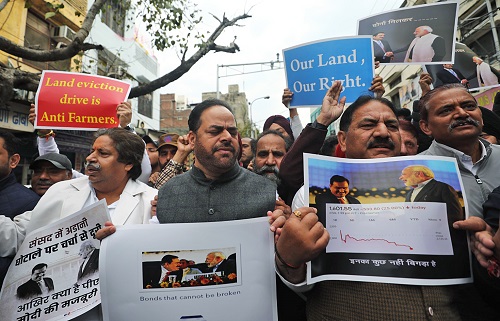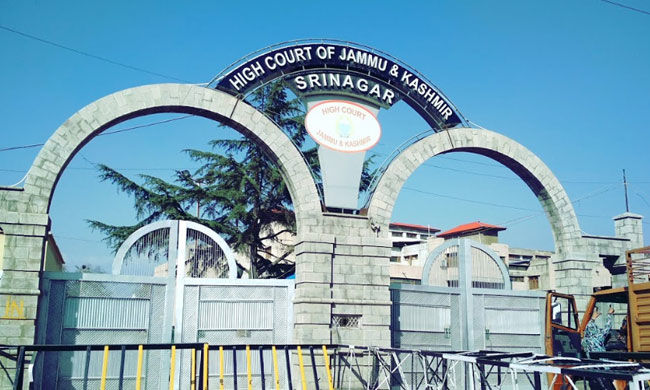Srinagar, Feb 06: Jammu & Kashmir and Ladakh High Court upheld the constitutional validity of government order on the formal closure of the Rehbar-e-Taleem (ReT) scheme and cancellation of all advertisement notices issued for engagement of the ReTs or panels with few riders.
A division bench comprising Justices, Sanjeev Kumar and Moksha Khajuria Kazmi made it clear that government order, issued on November 16, 2018, will not affect the select panels prepared by the respondents which have been acted upon and formal orders of engagement have been issued.
The bench ruled that the order will not override or effect the judgments passed or to be passed by the court holding a candidate or candidates entitled to engagement in the selection process which was/is under challenge before it.
‘Where the select panels are approved and the aggrieved party has approached the court before it could be acted upon, shall also be not affected by the impugned government order, in that, but for litigation in the court, the approved panel/panels could have been acted upon and formal letters of engagement in favour of the selected candidates issued prior to the issuance of the impugned government order,” the court said.
The court also made it clear that notwithstanding issuance of the order, the respondents shall abide by the judgments passed by any competent court of law which have attained finality.
“However, the writ petitions involving adjudication of disputes in respect of tentative merit lists or tentative select panels shall be liable to be dismissed in view of the government order, in that, it would not be permissible for a Court of law to direct the respondents to finalize the tentative merit lists or tentative select panels and issue engagement orders in view of closure of the scheme.”
The court passed the rulings in a bunch of petitions challenging constitutional validity of government order while observing that the government order is prospective in nature and does not seek to reverse the processes which have culminated into creating any vested and accrued rights.
Terming the challenge thrown to the order “baseless and misconceived”, the bench said that scheme known as ReT was promulgated by way of an executive order and the scheme did not contain any promise much less a categoric and unequivocal promise that the scheme will remain in operation for all times to come, on the basis whereof, a candidate can claim to have entertained a legitimate expectation.
It noted that in the instant case where pursuant to advertisement notices issued under the repealed scheme, the selection panels, which have been prepared and acted upon and the formal engagement orders have been issued, are not affected by the government order.
“They shall continue to work as ReT till they are considered for their regularization under the repealed/closed scheme,” the court held, adding that this is so vividly and unequivocally provided in paragraph first of the said order.
However, the bench held that neither participation in the selection process, nor mere placement in the select list gives any vested right to a person who has participated in the selection process and is figuring in the select list, to be necessarily appointed or engaged.
“The Selecting Body/Appointing Authority is well within its powers to withdraw the selection process provided such withdrawal is not arbitrary and violative of Articles 14 and16 of the Constitution,” the court said.
Regarding the submission of counsel representing petitioners that respondents are denying petitioners the benefit of concluded judgments passed by the Court on the ground that the same are incapable of being implemented in view of issuance of the government order, the court held that in the constitutional scheme, the executive is under an obligation to obey the judicial orders.
“The legislature may, in certain situations, nullify a judicial or executive decision by enacting appropriate legislation, however, absent such legislation, neither the executive nor the legislature could set aside a judicial order,” the bench said.
The bench underscored that permitting the executive to review, revise or sit over the decisions of the court by issuing executive orders or instructions would be tantamount to interference with the exercise of judicial functions by the judiciary.
The court ruled that the executive is bound to comply with the orders of the court and has no power, jurisdiction or competence to sit over or overturn such a decision by mere executive fiat.
A division bench said that the order whereby the closure of ReT Scheme has been directed is, on the face of it, prospective in nature and does not, in any manner, provide for interfering with, taking away or destroying the vested and accrued rights of the petitioners.
The bench said that the order nowhere provides, rather it is very specific and categoric that the candidates already appointed under the ReT scheme or on the pattern of ReT scheme shall not be disturbed and would be governed by the erstwhile scheme/schemes till their regularization or otherwise.
“Since mere placement of a candidate in the panel tentative or final does not confer any right upon such candidate to be selected and appointed, as such, we find nothing wrong in the impugned Government order providing for cancellation/withdrawal of all existing panel or panels of selection in existence on the date of issue of the impugned Government order,” the court recorded.
It further recorded that since the ReT Scheme and the other Government orders providing for engagements on the pattern of ReT Scheme have been closed, no fresh advertisement or engagement against any of the post earlier identified to be filled up under ReT pattern can be issued.
“In view of the discussion made and the reasons given above, challenge to the constitutionality of the impugned government order fails and consequently, all the petitions are disposed of by providing that the impugned government order shall be understood and made applicable in the manner explained herein above in the judgment,” the court said.








